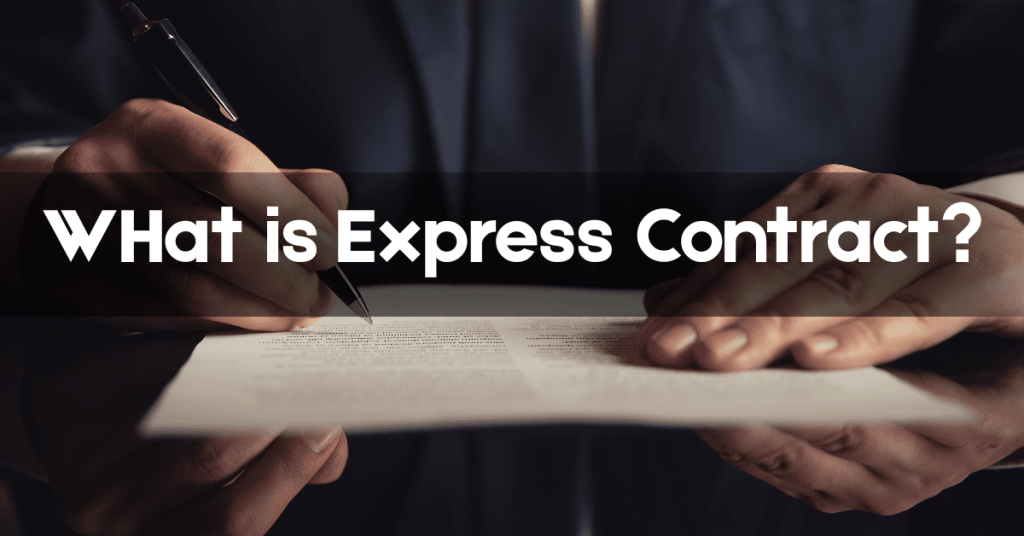Every major business relationship, whether with a supplier, technology partner, or franchisee, begins with one crucial element: a clear contract. For enterprises managing hundreds of such agreements, this clarity is more than a formality. It protects them from financial loss, operational delays, and compliance risks.
This is where express contracts help. These contracts state all the terms of the agreement explicitly, from pricing and service levels to delivery timelines and confidentiality, leaving nothing open to assumption. Every party knows exactly what is expected from them. This clarity keeps relationships transparent and makes the contract legally enforceable.
In an era where enterprises operate across multiple jurisdictions, relying on verbal understandings or informal deals can lead to disputes. Express contracts remove this uncertainty by documenting all rights and duties in precise, enforceable terms. They allow businesses to maintain compliance and work faster with full confidence.
What is Express Contract?
Express contract is an agreement where both the parties straightforwardly mentions the contract terms. The parties can mention the terms verbally or can give in writing. In this, parties are completely aware of the terms and that they are binded by the rules. Also, they can take legal actions against each other incase any party does not follow the terms.
Key Legal Requirements of an Express Contract
An express contract must satisfy several legal and operational requirements in order to be enforceable. These are:
1. Offer
Every express contract starts with a clear proposal (known as an “offer”) from one party to another. It clearly states what is being provided, under what terms, and what the other party is expected to do in return.
For example, a vendor offering to supply cloud infrastructure at an agreed-upon price forms an offer.
2. Acceptance
Thereafter, the other party that received the offer must explicitly accept its terms without modification. In the case of enterprises, the agreement often requires formal approval by their legal or finance team.
3. Consideration
The express contract must include an exchange of value, which the parties must agree to. These can be payment for goods and services used, licensing rights, exclusivity clauses, etc.
4. Awareness and Consent
Another essential condition is that both the parties must understand and willingly agree to the contract. Enterprises ensure this by keeping records of their negotiations, tracking different versions, and getting the necessary signed approvals.
5. Capacity to Contract
Both parties must have the necessary legal and operational capacities to enter into a contract. Authorised signatories of a company can sign contracts on behalf of the organisation.
6. Legality
The contract must be made to serve a lawful purpose. Agreements made for performing illegal or unethical activities are void regardless of whether the parties have consented to them or not.
Legal Standing of Express Contracts
An express contract becomes legally enforceable once all the abovementioned requirements are met. Courts also favour these contracts because the intent of the parties and all the terms are documented clearly, leaving very little ambiguity in them.
Section 10 of the Indian Contract Act, 1872, provides that an agreement made by competent parties with lawful consideration and purpose is a valid contract. This legal certainty helps enterprises enforce their rights when another party fails to meet its obligations.
For multinational corporations, express contracts serve as essential tools for risk management. They specify the laws governing the contract, define jurisdiction, and also outline the mechanism for dispute resolution. This clarity helps avoid confusion, ensures that issues are handled in familiar legal settings, and protects the enterprise from costly litigation.
Once these legal foundations are established, enterprises apply express contracts across various functions to ensure consistency and compliance.
Examples of Express Contracts
Large business organisations execute express contracts across almost all departments and functions. Here are some examples:
- Master Service Agreements (MSAs): Set out the long-term terms of engagement between a company and its vendors or service partners.
- Employment Agreements: Clearly lay down the job roles, compensation, confidentiality obligations, and grounds for termination of employees.
- Licensing or Franchise Agreements: Define how a franchisee can use the brand, pay royalties, and maintain operational standards.
- Non-Disclosure Agreements (NDAs): These are executed to protect sensitive business information that is shared with partners, vendors, or investors.
- Procurement or Supply Contracts: Lay down pricing, quality standards, and delivery timelines for goods or services.
These contracts help enterprises create an environment of clarity and accountability among their stakeholders. By setting clear expectations even before the work starts, they reduce risk, prevent misunderstandings, and allow business relationships to move faster with greater trust.
Practical Features of an Express Contract
The following features distinguish express contracts from other forms of agreement:
- Clarity of Terms: Every clause is explicitly defined in writing or speech.
- Mutual Consent: Both parties expressly agree to the same terms and conditions.
- Form of Agreement: While verbal express contracts are legally valid, large enterprises prefer the written ones, since it is easier to maintain their records and audit trails.
- Enforceability: Express contracts create legal obligations that both parties to the express contract must honour.
- Evidence of Communication: Signed documents, digital records, and mails serve as proof of agreement between the parties.
Breach and Remedies
A breach of contract occurs when one party fails to perform its duties or fulfil the obligations mentioned in the terms of the contract. Breaches in enterprise contracts often arise from delayed deliveries, outstanding payments, or improper handling of confidential information.
The Indian Contract Act, 1872, and the Specific Relief Act, 1963, provide the following remedies for breach:
- Damages: The party that has suffered a loss can claim financial compensation from the defaulting party for the harm caused by the breach.
- Specific Performance: In some cases, a court may direct the defaulting party to carry out their agreed obligations rather than simply pay damages.
- Injunction: A court can also stop a party from taking certain actions that would go against the terms of the contract.
To enforce express contracts effectively, businesses must know whether obligations are being met in real time. A legal intelligence engine makes this possible by tracking key dates, renewals, and compliance steps across all active contracts.
From Legal Clarity to Business Impact
Express contracts are crucial for all business organisations because they bring order and transparency to complex business relationships. They define the rights of the parties, set the right expectations, and help both sides stay accountable and compliant.
For enterprises, managing hundreds of contracts often becomes a challenge, especially if they are scaling up fast. Legistify’s Contract Management Software is the perfect tool for them. It gives enterprises a competitive edge by streamlining their entire contract management process. It combines AI-powered intelligence with automation to provide legal teams with actionable insights into their contracts. It helps them identify risks early, stay compliant across regions, and keep every contract aligned with business goals.
Book a demo of Legistify to see how your enterprise can manage contracts faster and with greater accuracy.
1. What is the difference between express and implied contracts?
An express contract clearly states all terms and conditions verbally or in writing, leaving no scope for interpretation or ambiguity. In contrast, an implied contract is formed through the actions or conduct of the parties. Enterprises prefer express contracts in their commercial dealings, since they offer greater clarity and are easier to enforce.
2. Are verbal express contracts legally valid?
Yes. The Indian Contract Act, 1872, states that a contract can be valid even if it is verbal, provided it fulfils the basic legal requirements of an offer, i.e., acceptance, consideration, and the intention to create a legal relationship. However, enterprises prefer written contracts since they are easier to handle, enforce, and audit.
3. Why are express contracts important for enterprises?
Express contracts provide proper structure and predictability to business operations by documenting the rights, responsibilities, and timelines clearly. This helps enterprises avoid misunderstandings, manage risks efficiently, and ensure compliance across jurisdictions.
4. What happens if an express contract is breached?
When a contract is breached, the aggrieved party can seek remedies such as damages, specific performance, and injunctions under the Indian Contract Act, 1872, and the Specific Relief Act, 1963. These remedies help ensure that the affected party can recover losses or compel performance of the contract.
5. How does Legistify help enterprises manage express contracts?
Legistify’s Legal Intelligence Engine gives enterprises complete visibility of their contracts. It tracks contract renewals, monitors compliance milestones, and flags risks early. This allows legal and business teams to act proactively, reducing delays, disputes, and financial exposure.



